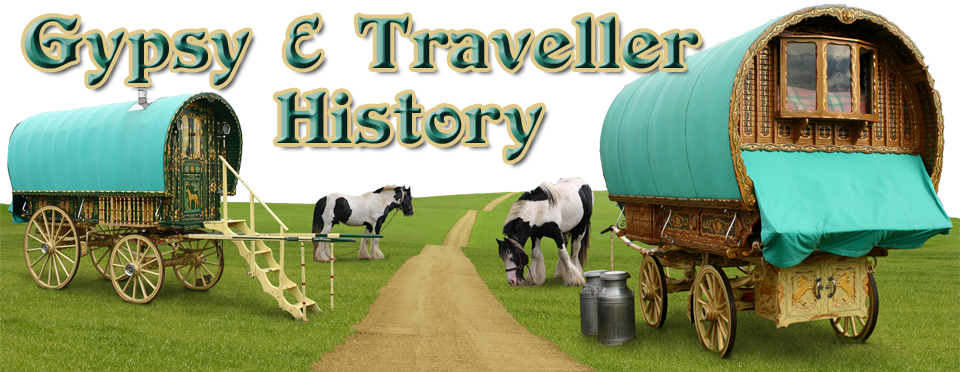Stories and Legend
Legend
There is a legend believed by some of the Gypsy community which says that when God made man he made him in the form of a cake, and baked the mixture in the oven. With the first one he forgot to turn the oven off and the cake burnt, and this was the Negro. The second time God was impatient and the cake was pasty and pale, and this was the white man. The third time he got it just right and the cake was golden brown, and this was the Gypsy.
Another legend stated that it was a Gypsy who stole the nails after the Crucifixion, and also the Crown of Thorns, and this is why Gypsies earned the right to steal other small items evermore. Yet another legend says that it was a Gypsy who forged the nails for the Crucifixion, and this is why the Gypsies were doomed forever to wander the world without a home.
A song about travelling
Tonight as I sat by the roadside
Just watching the travellers go by
I wonder what becomes of those travellers
When it comes to their turn to die
Will there be any travellers in heaven?
Any places where we can stay?
Will there still be the same old councils
To tow our old trailers away
Will the gordgies join with the travellers?
Will they always have laughter and care?
Will there be any travellers in heaven?
In the land that lays hiding up there.
May Orchard
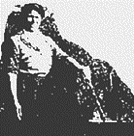
My Mum did her washing outside on the fire. In the photo she is doking the washing with a doking stick. We used a swing handle pan for frying and a black pot for cooking in. She fried breast of mutton. Mum would make meat puddings on Sunday in the black pot. She did potatoes and cabbage and boiled bacon. She was a good cook.
 We moved to Devon the year Elvis died. We had a horse named Sam. This is the horse that my Mum would take out every day. He would not be tied up. If my Mum was down the road she would shout “come on, Sam” and he would walk down to my Mum.
We moved to Devon the year Elvis died. We had a horse named Sam. This is the horse that my Mum would take out every day. He would not be tied up. If my Mum was down the road she would shout “come on, Sam” and he would walk down to my Mum.
Ena is a Giorgia woman. She used to come and see us every day at Nottingham. She got to know us and my Mum, Dad and family treated her just like she was one of us. My Mum was not greedy. She would help you if she could. She would tell you right from wrong. She was a good mother.
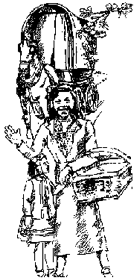
My Mum loved calling and she loved her grandchildren. She had thirteen grandchildren. She died on 13th October 1990. She had a heart attack.
She died in her caravan. She had a big funeral. People came from all over to her funeral. She had lots of flowers, a caravan, a pot, kettle, a dog, a garden, baskets, a kettle iron, a calling bag, wreaths and sprays.
From The Life and Story of May Orchard by Dorothy Orchard
Moving with the Times
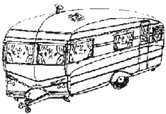
Even though they were in the house, my Grandmother still put her plates up, and made the inside look as much as she could like the home she had always had.
My Granddad put my Dad into school for a while and he ran a scrap yard with my uncles. My Dad did learn to read and write in school but he never liked the house, and as soon as he was old enough he left and started to travel again. While he was travelling from place to place he met and married my Mam. He carried on with scrap for a while and he also bought and sold trailers. Sometimes he would have to paint them and rebuild them. Other Travellers would come to him to have their trailers fixed or made more fancy.

The same designs were cut into the glass in the windows and mirrors that used to be carved in wood on the old wagons. The outsides of some of the trailers were decorated with chrome. Travellers put mirrors and chrome everywhere they could. I have heard that some even put a mirror on the floor.
Then, by talking to other Travellers, my Dad found out he could make more money out of tarmac. He was stopping in London, and that was where I was born, in 1974. My Mam and Dad had four children, and I am the oldest. I remember being in London and going out with my Dad in the lorry when I was very small.
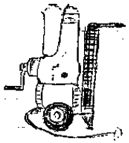 Me and my brother Teo used to go with him all the time. I remember my Dad fixing trailers and painting them for people and doing all other sorts of work.
Me and my brother Teo used to go with him all the time. I remember my Dad fixing trailers and painting them for people and doing all other sorts of work.
I still do tarmac and I buy and sell motors, cut trees, do painting and sometimes scrap. I learned all this from watching my Dad and working with him as I grew up.
We had a portable generator to make the electricity for our lights. Later on we had a bigger diesel one, with a big handle for starting it up. We had a coke fire and a gas cooker in the trailer, but my family still do make a fire outside.
My Granddad didn't make the wagons anymore because there was not so much call for them. He started to make model wagons instead. We have one in our trailer, just like the one my Dad lived in when he was a child.
My family had a place on a site once but it was closed down. There were never enough places to stop and we kept getting moved on. I went to school for a while and learned to read and write. My Dad taught me ways to make a living. I would watch him and he would tell me what to do.
Some of the jobs we do, like tarmacking and cutting trees, Travellers have been doing for years. Some trades are new, like steam cleaning and putting new PVC windows in. My grandfather and great grandfather used to deal in horses. Me and my father deal in motors.
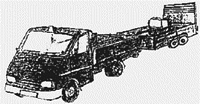 Some Travellers think that the flashy chrome trailers make you stand out too much. They have bought the new German Weippert trailers which are plainer. It is easier to pull on trailer sites with them. They have more wood inside for the cupboard doors and not so many mirrors, so they are easier to keep clean. You can get smaller portable generators now for your lights and television, with electric starter motors.
Some Travellers think that the flashy chrome trailers make you stand out too much. They have bought the new German Weippert trailers which are plainer. It is easier to pull on trailer sites with them. They have more wood inside for the cupboard doors and not so many mirrors, so they are easier to keep clean. You can get smaller portable generators now for your lights and television, with electric starter motors.
My father is hoping to get a place on a new site. If he gets it, he may put a mobile home or a chalet on it and settle down.
I don’t want to stay in one place.
From Moving with the Times by Goodiy Reilly
One in a Million
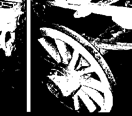
We were picking taters at sixpence a bag, October time. The family allowance was five shillings. It wasn't enough. When the work was done we went back on the road to Dover, to the woods, making baskets and pegs. There was no farm work in the winter.
My sister Louie sold pegs and baskets with my Mum. It was freezing in the cold and we were hungry and wet. Mum would come home and put on the meal. She was exhausted and went and lay down. She was crying.
Mum's bed in the wagon was across the far end. It had a star mirror on the headboard. There were three other mirrors, cut mirrors, with baskets of fruit. The bed had army grey wool blankets with red braiding.
The curtains, a long one in front of Mum's bed, and the others, were red check gingham. They had tassels on the borders. Underneath Mum's bed was the bed for the littl'uns. It was like a cupboard.
It was time to move. It was snowing in Kent, Charing Hill. It was so slippery the horse went on his knees.
My brother-in-law stopped a lorry and the man pulled the wagon with chains.
Half way up the wagon came unhooked and ran back. It fell over in the ditch. It broke a wheel. It was at the wainwright for three weeks. Mum made a tent with sheep hurdles and a tarpaulin. It was cold with no wagon.
 This is how I remember my mum. She was more than six foot tall. I remember her with black hair, very wavy, not curly. Her hands were long with very long fingers.
This is how I remember my mum. She was more than six foot tall. I remember her with black hair, very wavy, not curly. Her hands were long with very long fingers.
Mum's skirt touched the floor. You could only see the ends of her shoes when she walked. It was a pleated red plaid skirt. Over the top was a black apron. She made her own skirts and aprons when we was little but when we was grown up we had them made up in Maidstone.
The apron had two horseshoe pockets with red braiding. And she had a side pocket with a belt and buckle which was f’w’apences. No-one could know what she had in there. She had it under her clothes.
We did our washing in a tub of water outside. We used a bar of red carbolic soap. We boiled the water on the fire in the baths we cetched the rainwater in. We had a wooden scrubbing board. The coloured clothes we put on the fence. We made a line, a rope between two trees, for the rest. We had our pegs. In the morning, if it was Winter, the clothes were stiff on the line with frost.
Cleaning pans was hard. We dipped a rag in water and then in the ash from the fire and we scrubbed at the pans. Cast iron pots go rusty and so we rubbed on fat from the roast taters. And we had to polish the brass and copper tinsas and the brass plates in the wagon.
Another job was painting the wagon. My brothers did this every three years. She was green on the outside with a white roof. The wagon was picked and painted out in red and yellow and it had pictures of hosses in frames on the sides.
In the Life of a Romany Gypsy
I have been asked many times, would I like to live in a house? This is something I just can’t explain to other people or make people understand, as living in a house is not my idea of life at all. I have lived in caravans – horse drawn and trailer – all of my life.
I am a man of the wilds, of the open air, of the fields and the woods, and I could not be this if I lived in a house. When I live in a caravan, I can sometimes see the branches of a tall tree through the skylight, and it is not always the same tree. I can hear all the sounds of nature clearly - like in the open - when I lie a bed at night; the sounds of nature that I would only hear in the distance, and muffled, if I lived in house.
When I step out of my caravan I like to feel the green grass under my feet; and I like to see the birds flitting in and out of hedgerows; and after a day’s work I like to have a good wash and sit beside my fire on the ground to have a meal of natural food - this wish is nowadays not always fulfilled - and to have a drink of tea with the smell of the wood fire in it. I like to listen to the last song of the blackbird in the evening, and as it begins to get dark I like to watch the stars come out and the moon come up, all in their natural full glitter.
I like to listen to the song of the nightingale and the hooting of the owls, and the screeches of the bat as he rushes through the air catching insects. I like the beating of the rain on the roof of the wagon and the singing of the wind through the treetops - the feeling of relief when you come to a stopping place and out of the gloom and the doom of a bad spell.
I like to listen to the grunt of the badger in the undergrowth and the clicking of a cricket in the thicket; and at the right time of the year I like to hear the cry of the vixen and the dog fox. I like to listen to the buzzing of the bees as they fly from bloom to bloom along a hedgerow, and I like to see the colours on the wings of the butterflies.
I even like the constant change from extreme comfort to extreme discomfort that is an essential part of living a good healthy life, and I like the feeling of uncertainty, of never knowing quite what lies around the corner, though I might know the area well. I like the feeling that, come what may, I will be able to win through in all circumstances, as long as I rely on myself and remain a Romany. These are the things that make up my life; I would like to have all of them and many more that I have not mentioned, all in their season, all of the time – and I could only have the smallest fraction of them if I settled down in a house.
Beyond that,
"You can trust a Romany for your best friend,
You can trust a Romany to the end;
He won’t rob you, he won’t lie -
You can trust him till you die;
But hate him and you’ll come off worse,
For he can haunt you with a curse !"
From In the Life of a Romany Gypsy by Manfri Frederick Wood
Moving Stories
Southwark Traveller Women’s Group
Travellers have changed their lives more in the last twenty years than ever before. When our mothers and fathers were growing up it was even harder. They were poorer in those days because they lived in the country, you’d never see a town. But at that time it was more happy for the Travelling people.
You were never left out – you never felt left out. That is still the best part. If anything happens to a mother or child there is always someone to talk to, and if anybody died each Traveller would tell other families. You’d mostly go to their home first and see someone belonging to them. You’d go over to their camp and stay as long as you could, making them a cup of tea. All the Travelling people would collect and go to that funeral. All the families down the road would stay with them, for at least three months with that family while they were getting over the trouble they’d had. If the family didn’t have enough money they would make a collection and they would pay.
If there was a death in the family there would have to be a whole year before they had a wedding. It showed that you respected the dead. And you didn’t put the radio on for a couple of months. They’d all wear black. If they didn’t have black they’d have a diamond shape on their coat, a black piece of material sewed on their coat and they’d have it on for twelve months. You’d always know that someone had died in the family. Most Travellers wear black now.
Romany Dialogue
“Can you rocker romani?
Can you fake the bosh?
Can you dick the vesher,
While Mandy chins the cosh.”
Meaning:
“Can you speak Romany?
Can you play the violin?
Can you watch for the park ranger?
While I cut some firewood.”
- Log in to post comments
